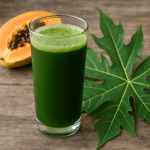Since watermelon (Citrullus lanatus) has high water content, you can consume a substantial amount of it while consuming fewer calories. It satisfies your craving for something sweet and juicy while quenching your thirst, making it the ideal summertime treat.
Watermelon provides essential nutrients, including vitamins, minerals, and antioxidants. The watermelon’s rind and seeds are edible, as well as the rest of the fruit. But have you ever thought about what would happen to your body if you eat watermelon every day?
Is it healthy to consume watermelon on a daily basis?
The fact that this fruit is called after water was not chosen at random. Calcium, magnesium, potassium, and sodium are vital rehydration salts found in watermelon, which is 92 percent water and 8% sugar. This fruit should be included in your weight reduction diet because it can stop dehydration.
Early explorers carried them instead of canteens
Lycopene, a strong antioxidant, is also abundant in watermelon. These compounds are beneficial in the battle against free radicals, which are molecules with an unstable structure that, if allowed to accumulate in the body, can be harmful to the cells there.
Some free radicals can be eliminated by the body naturally, although dietary antioxidants aid in this process. Supplemental lycopene may slow the progression of localized prostate cancer, according to one clinical trial.
Cancer prevention program
Potassium is also abundant in watermelon. This electrolyte plays a crucial role in maintaining normal nerve and muscle function and can mitigate sodium’s impact on blood pressure. All of the benefits of lycopene that watermelon contains benefit your heart as well.
Studies suggest that lycopene may aid in lowering blood pressure and cholesterol. Another potential benefit is a reduction in oxidative stress due to high cholesterol.
Your blood won’t be that angry anymore
Many people mistakenly believe that watermelon is high in sugar and calories when, in fact, it is lower in both. The United States Department of Agriculture (USDA) reports that such a cup of watermelon contains 45 calories, 11 grams of carbs, and 9 grams of sugar that occurs naturally.
Since this fruit is mainly water, it makes you feel full and prevents you from wanting to nibble on your favorite foods. Fresh watermelon chunks as an appetizer might be a good way to lose weight.
You control your weight now, not the other way around

Watermelons are primarily composed of water, with only a trace amount of fiber. Prebiotics, a form of fiber that encourages the development and/or activity of advantageous bacteria found in the large intestine, are also present in the fruit in addition to fluid. Reducing constipation and encouraging regular bowel movements, will support gut health.
Prepare yourself to go to the bathroom like clockwork
On the other hand, consuming excessive amounts of lycopene—more than 30 mg per day—can potentially result in bloating, indigestion, nausea, and diarrhea. Additionally, the fruit contains sorbitol, a sugar molecule that promotes watery stool and gas problems. The likelihood of this happening is higher if you’ve had too much fruit.
Diarrhea is my last name
The amino acid arginine, which is healthy for the circulatory system and heart because it calms blood vessels similarly to Viagra, is created when you consume watermelon by enzymes in your body. In principle, however, you would also need to eat a lot of watermelons. There is published evidence that supports this benefit, thus more research is required.
Even watermelon is not too family-friendly at times
Free radicals that are thought by some experts to play a role in the growth of asthma may be combated by watermelon and other foods high in vitamin C. According to a study done on 17 asthmatic persons, lycopene may be able to treat the condition. According to a survey, persons with asthma may benefit from getting enough lycopene and vitamin A.

Asthma doesn’t have authority over watermelon
Have a strenuous workout scheduled? Before working out, consume some watermelon or watermelon juice. In addition, the juice slowed down their heart rate, which aided in their recovery. Researchers found that watermelon juice’s L-citrulline content, an amino acid that lessens muscular damage, is responsible for its capacity to soothe sore muscles.
No more excuses for not exercising
You can get 9–11% of the recommended daily allowance of vitamin A from only one average slice of watermelon. Lycopene is another important antioxidant, along with vitamin A, which is essential for the health of the skin and eyes. As they provide defense against free radicals, antioxidants are crucial for maintaining good eye health. Free radicals’ effects can be frightening because they could cause the eye lens to deteriorate.
Wearing glasses is not comfortable
The amount of water in human bodies may rise if we eat a lot of watermelons. If you drink too much water, your body may become out of balance and the fluid may flow from your blood into your cells, further inflating them. Water intoxication may result if the extra water is not expelled. When your body has too much water in it, a condition known as water intoxication or overhydration, the salt content is lost. Additionally, it could result in fatigue, weak kidneys, and leg edema.
Don’t you want to avoid drowning in your own flesh?
So, Is it recommended to eat watermelon every day?
Adding watermelons to your diet is a great choice because of all the good things they can do for you. For people trying to lose weight, eating a lot of foods high in water content, like watermelon, might be seductive because they make you feel full. Its excessive intake, however, can have negative health effects. Consuming too much of anything, even something as nutritious as a watermelon can be unhealthy.
Did you find this helpful? Share in the comments section below.
You might also like:








